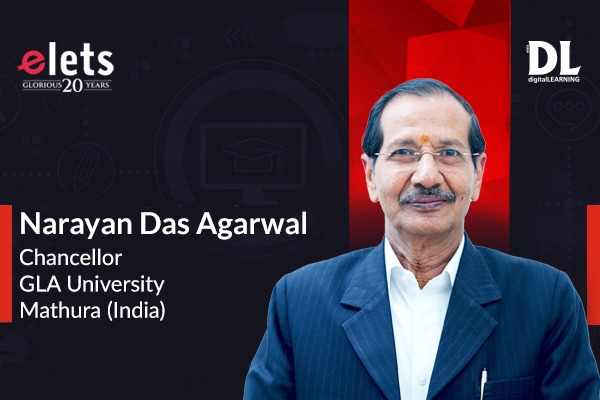
In today’s world, technological progress is relentless. With innovations like AI, IoT, and Blockchain, our lives are changing rapidly, ushering in an era of unprecedented possibilities and challenges, shared Narayan Das Agrawal, Chancellor, GLA University, Mathura (India) in an exclusive interview with Sheeba Chauhan of Elets News Network. Edited excerpts:
As one of India’s leading business schools, how do you view the current state of education in India? What specific reforms do you think are most important to better prepare our students?
The current state of education in India is characterised by a mix of challenges and opportunities. We strive hard to modernise the curriculum, promote digital literacy, and enhance skill-based training to better prepare students for the evolving job market. It is a dynamic landscape with ongoing reforms and improvements.
Several specific reforms can better prepare business students in India:
1. Curriculum Modernisation: Update the curriculum to align with industry trends and global best practices. Include courses on emerging technologies, sustainability, and entrepreneurship.
2. Experiential Learning: Promote practical learning through internships, industry projects, and case studies to bridge the gap between theory and practice.
3. Digital Literacy: Integrate digital skills into the curriculum, focusing on data analytics, digital marketing, and e-commerce.
4. Industry-Academia Collaboration: Strengthen ties with businesses to ensure that the curriculum remains relevant and that students have access to real-world insights.
5. Diversity and Inclusion: Nurture an inclusive environment that reflects the diverse business world, promoting gender and cultural diversity.
Technological advancement is happening at a rapid pace. How has your curriculum evolved at GLA University in recent years to build more tech related skills? What new courses or program changes have you introduced?
In today’s world, technological progress is relentless. With innovations like AI, IoT, and Blockchain, our lives are changing rapidly, ushering in an era of unprecedented possibilities and challenges. At GLA, we are highly concerned about nurturing the robust tech-related skills in our students. In a quest to make our students conversant with emerging technologies, we have launched the following specialised courses on emerging technologies, apart from the regular ones:
Attracting top professors is an ongoing challenge. What unique approaches have you found effective at GLA University for recruitment and retention? Any best practices you’d recommend to your peers?
At GLA University, we employ innovative approaches like offering flexible work arrangements, emphasising interdisciplinary collaboration, providing research support and grants, fostering a diverse and inclusive academic environment, and establishing mentorship programs to recruit and retain professors. These strategies help us attract top talent and create a supportive and engaging academic community.
We recommend best practices such as conducting comprehensive and transparent recruitment processes, offering competitive compensation and benefits packages, providing professional development opportunities, creating a conducive work-life balance, and garnering a culture of appreciation and recognition. These strategies can help our peers attract and retain high-quality faculty members.
Accessibility is so important yet costs continue rising. What partnerships or funding models has your university pioneered to help more students, especially from underprivileged areas?
Promoting accessibility in higher education, especially for underprivileged students, is indeed crucial. To pioneer partnerships and funding models at GLA university to achieve this goal, we consider the following approaches:
1. Corporate Partnerships: We collaborate with local businesses and corporations to create internship opportunities, co-op programs, or sponsorships that provide financial support to students in exchange for work or research contributions.
2. Community Engagement: We forge partnerships with local community organisations, K-12 schools, and non-profits to identify and support promising students early in their educational journey. Also, we have adopted villages to ensure the students there receive quality education.
3. Online Education: At the Centre for Distance & Online Education, GLA University, we have developed high-quality online courses and degree programs to reach a wider audience, including those who may have difficulty attending classes in person. These programs can be more cost-effective and flexible, making education more accessible.
4. Research Partnerships: We have collaborated with research institutions, government agencies, and foundations to secure research grants and funding that can be used to support underprivileged students while also advancing research initiatives at the university.
5. Scholarship Scheme: The aspirants have the opportunity to avail different merit-based scholarship programmes at GLA University.
6. Earn While You Learn: Our 5-Year Integrated MBA program allows the aspirants to get benefits from ‘on job’ curriculum based experiential learning.
By exploring a combination of these strategies and tailoring them to the specific needs and resources of GLA university, we make significant strides in improving accessibility and reducing costs for underprivileged students.
With globalisation being inevitable, how do you see GLA University continuing to evolve its curriculum for the international stage? What new aspects are priorities?
To thrive in an era of globalisation, GLA University encourages experiential learning to match the global standards. This entails offering diverse courses, fostering cross-cultural exchanges, and embracing digital learning tools. We are associated with 150+ international institutions across the globe as an academic partner to impart quality education with a global outlook. It helps us in academic and cultural exchange through various international immersion programmes.
Moreover, we also prioritise interdisciplinary programs that address global challenges. By preparing students to navigate a globalised world, GLAU remains relevant and promotes cultural understanding, critical thinking, and collaboration on an international stage.






















